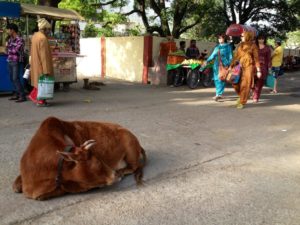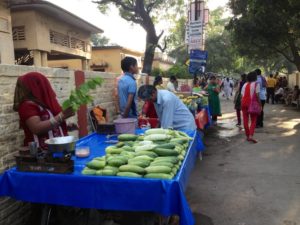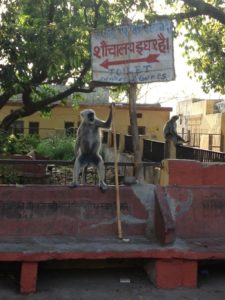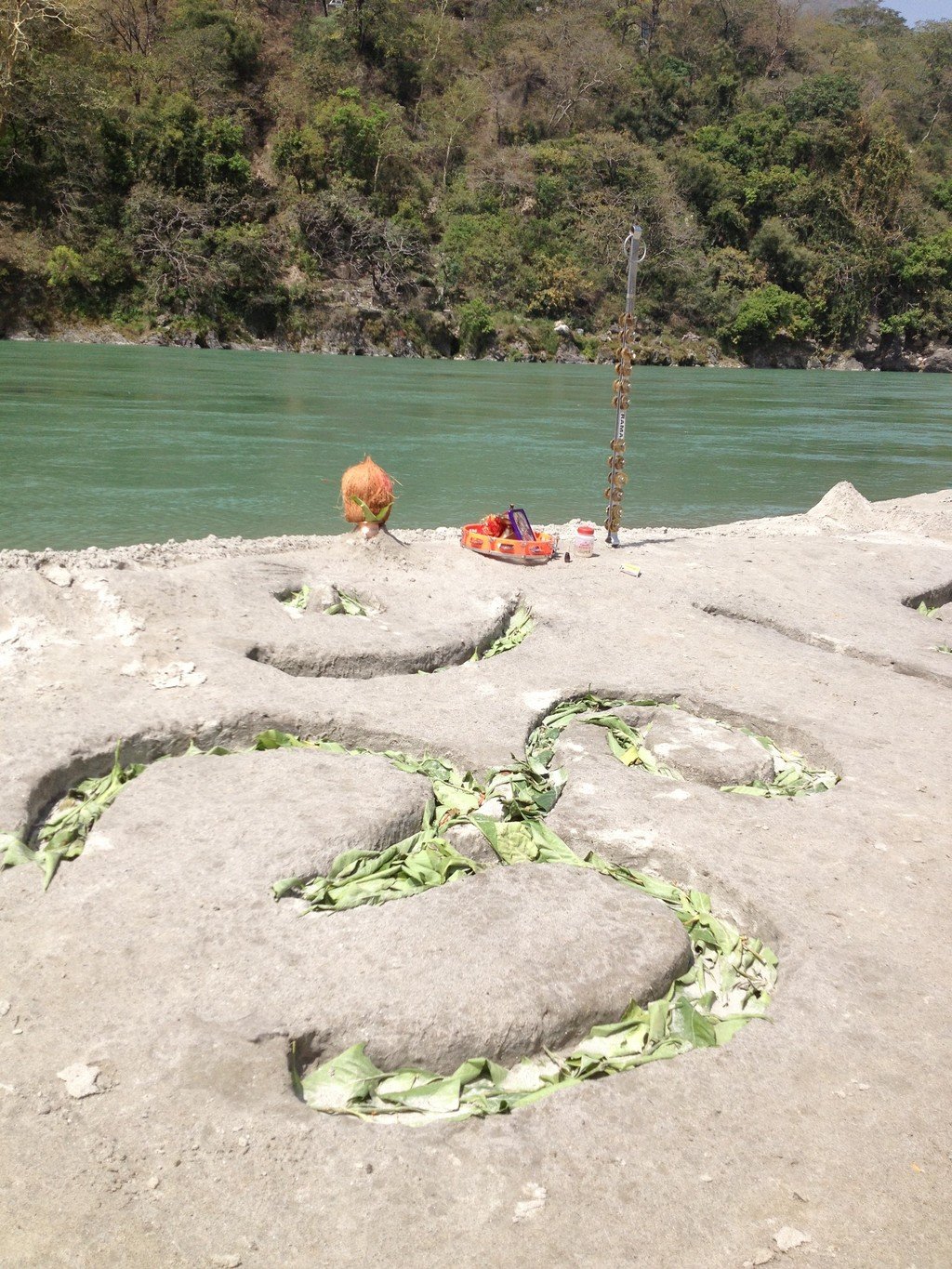
On the sandy shore near the river, a white girl with a European accent had finally given in to the official “ear cleaner” and his persistent pleas to “give you a good clean.” I had secretly been watching out for someone to succumb to the ear cleaner’s sales pitch after recently reading about the practice of Indian ear-cleaning in the book Lunatic Express by Carl Hoffman. The red capped Indian boy with the fluffy cotton swabs behind his ears was kneeling in the sand and meticulously scraping out bits of wax from her ear, showing her the contents of his tools each time he withdrew 
A baba in an orange lungi and matching headscarf dug with a large knife into the sand on the riverbank for several hours. He sang aloud to himself, humming about Shiva and “Hari Om-ing” as he carved out the sand into shapes and smoothed the area around the relief flat with his hands. As a trio of Israeli men strode by and awkwardly snapped photos with their Ipad, he held up a hand and shook his head, “No photo, please.” Later on, he filled in the carvings with leaves and built a simple shrine around them, complete with a coconut, some bells, and a piece of tattered red fabric that fluttered in the breeze like a flag.
Teenage Indian girls strode by, knee deep in the water and wearing skinny jeans. Their long black hair was shiny and full of glittery barrettes. They casually slung their bedazzled sandals at their sides, straps dangling from their thin fingers.

On the walk back to our guest house, which goes directly through Swarg Ashram, the small street is lined with vendors on one side and permanent cement benches on the other. There is an enclosed air conditioned ATM with a sleepy guard slumped in his chair on its stoop and a pile of puppies sleeping in his shadow. Despite the fact that the street really seems more like a path, motorbikes and occasional vehicles still honk their way through, only mildly disrupting the flow of foot traffic. In the evenings, big gray monkeys with black faces climb down out of the banyan trees and sit quietly on the fence, comfortably holding their long toes with their long fingers.

Others sell freshly popped popcorn out of a steaming iron pan. Bicycle boys precariously balance their mangoes, packed loosely in big round baskets that look like bird cages secured above the back tire. Carts of colorful produce practically overflow with creatively carved papayas, pomegranates, and watermelon on display while cones of incense burn between the melons and vegetables, emitting teensy spirals of smoke. Samosas and other fried snacks are stacked high, individually wrapped in newspaper upon purchase, which quickly soaks up the grease leaving you with slick fingers after eating. A burly man with a ponytail slaps doughy potato balls from palm to palm then drops them in a sizzling vat of oil. Another cart is lined with glass bottles, each containing unnaturally bright colored liquid used to make snow cones. Fresh lemon soda is being peddled from the cart across the way, with open bottles of soda water lined up, each topped with a lemon balanced on the lip of the bottle.
Any guidebook will tell you to absolutely not eat or drink street food, especially fresh produce that hasn’t been “peeled or boiled.” This is frustrating, as everything looks so damn delicious (flies and all).

The ever-present smell of shit and incense isn’t so novel once you’re sick. In fact, it is practically unbearable. It is also everywhere: splattered landmines courtesy of the teeming cow population which require diligence and skill to safely navigate around. Smiling Indian families insisting that you stop and snap photos with them while you’re desperately on your way back to your room from the pharmacy and seeking out a clean bathroom isn’t nearly as amusing either.

Once these meds kick in, we will be taking a 14-hour bus trip north in the state of Himachal Pradesh to the Dalai Lama’s home of Dharmsala in a few days and onward into the Himalayas. Still seeking higher altitudes and lower temperatures. Hopefully this bus journey will be marginally more tolerable than the last, since it’s twice as long…








Get your ears cleaned by that dude, its legit. Feels great. Like A breath of fresh air for your whole head. And eat the veggies, youll be fine. I practically survived off grapes in rishikesh. I never made it to Dharamsala, but I intend start in Delhi instead of mumbai next time so I can make it to more spots in the north. Thanks for writing. I like your perspective on things, as it seems to reflect the character you play here in America. When I was in india I let my self succumb to every influence and found myself crying in temples in varanssi, reeling from the spiritual energy, completely forgetting how much I hate organized religions until I was confronted by the materialism the seems to permeate all dogma. Still I humbled myself before countless babas and sadhus looking for spiritual influence, half of them were just vagabonds who love to get high, others were devout shivaiites who could pass on some wisdom, even if was just learning how to sit still and be quiet around complete strangers without introducing yourself or feel uncomfortable, somehow reminding me that we are all one, that introductions were useless. The conviction with which sadhus accepted these seemingly cliche sentiment was inspiring. Either way a couple chillums shared with friends is never a waste of time.